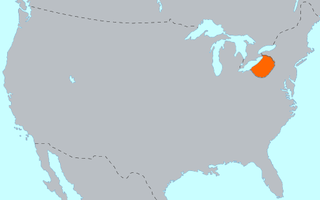| Erie | |
|---|---|
| Native to | United States |
| Region | south of Lake Erie |
| Ethnicity | Erie people |
| Extinct | 17th century, 1 known speaker |
Iroquoian
| |
| Language codes | |
| ISO 639-3 | None (mis) |
qgl | |
| Glottolog | erie1238 |
 Nation du Chat region | |
Erie was believed to have been an Iroquoian language spoken by the Erie people, similar to Wyandot. But it was poorly documented, and linguists are not certain that this conclusion is correct. There have been few connections with Europeans and the Erie's with the French, and Dutch being peaceful, while the English being mostly hostile.
The names Erie and Eriez are shortened forms of Erielhonan, meaning "long tail", referring to local panthers. The Erie were called the "Cat people" (Nation du Chat in French; Hodge 1910,[1] Swanton[2]).
At least one loanword survives from the Erie language: Chautauqua, a word of uncertain definition/translation.[3]
Translation of words
- Erielhonan (Long Tail)
- Ronnongwetonwanca (Good Luck)
- Kahqua/Kahkwa (Possibly the name they called themselves)
- Gùkulëáwo (Wolf)
- Chautauqua (A bag tied in the center/middle) or (Two moccasins tied together)
References
- ^ Erie (Huron: yěñresh, 'it is long-tailed', referring to the eastern puma or panther; Tuscarora, kěn'räks, 'lion', a modern use, Gallicised into Eri and Ri, whence the locatives Eri'e, and Riqué, 'at the place of the panther', are derived. Compare the forms Erieehronon, Eriechronon, and Riquéronon of the Jesuit Relations, signifying 'people of the panther'. It is probable that in Iroquois, the puma and the wild-cat were originally referred to by the same generic name, and that the defining term has survived as the name of the puma or panther).
It was a populous, sedentary Iroquoian-speaking tribe. In the 17th century, the Erie occupied territory extending south from Lake Erie probably to the Ohio River, east to the lands of the Conestoga along the east watershed of Allegheny River. Their language was thought to resemble that of the Hurons (Wyandot), known as an Iroquoian people.
Smithsonian Institution Bureau of Ethnology Bulletin #30. - ^ "Erie". Meaning in Iroquois, "long tail," and referring to the panther, from which circumstance they are often referred to as the Cat Nation. The Erie belonged to the Iroquoian language family. Also called: GA-quA'-ga-o-no, by Lewis Henry Morganal (1851)
- ^ "Stories behind names of many familiar places". Olean Times Herald. February 7, 2016.
